Sadly, all good things come to an end and this series review is no different. Let’s look at the last three entries before I give my opinion on all of them.
Prince for Egypt
Obviously a retelling of the Biblical story of Exodus with some unique Dingo touches.
First of all, the narrator here is not the usual bird.
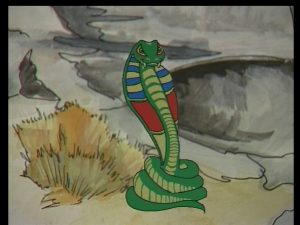 The Narrator
The Narrator
And Egyptians have a very distinct appearance (though they look somewhat like Atlanteans).
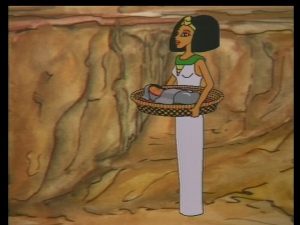 A princess that adopted Moses
A princess that adopted Moses
And Moses did not merely had a brother Aaron but also they had a pet crocodile Benjamin who actually helped to push the crib on the river to a safe place. Later another kid is sad because he can’t take his pet crocodile with him (because it will die without water in a desert on the way to the Promised Land). I think pet crocodiles should’ve been mentioned more often in the Bible.
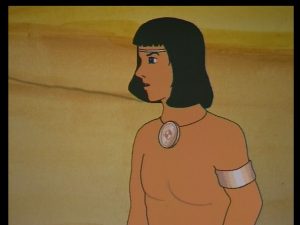 Grown up Moses
Grown up Moses
There’s also a change in depicting scene with the burning bush that contradicts the religious concepts but I guess the change helps children understand it better than just watching on some random burning bush talking. If you want bushes talking—see Pocahontas again.
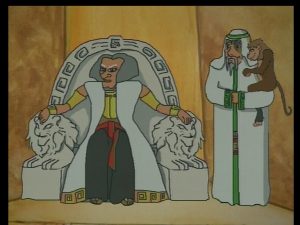 Pharaoh, his advisor and advisor’s advisor
Pharaoh, his advisor and advisor’s advisor
And I bet you didn’t expect a monkey to be sent to spy on slaves either.
It ends peacefully too, without Egyptians being swallowed by the Red Sea.
Overall, it’s not something outstanding but if you’ve watched other Dingo Pictures cartoons you may watch this one as well.
The Sword of Camelot
This is a retelling of Arthurian Legends. And to get rid of obvious references early: ni!
This is the only other cartoon beside Bremen Musicians that got a live narrator. Who is also Merlin. It’s somewhat funny how other stories have wizards or oracles looking like a stereotypical Merlin but here he’s quite different.
Anyway, this story covers not merely a story of Arthur but also his other knights…
…fair ladies…
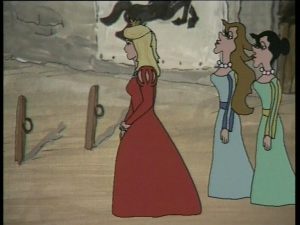 Guinevere with her ladies-in-waiting
Guinevere with her ladies-in-waiting
…in the castles.
And the story spans to the pinnacle—finding the Holy Grail—and behind, when the story of King Arthur and his Knights of Round Table really ends.
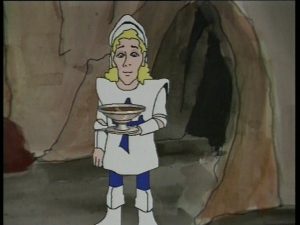 Sir Galahad
Sir Galahad and Temple of Doom
This was refreshing and in other stories you often don’t get the origin of other knights or full understanding of Merlin’s role in all things but here it’s all present. Worth watching IMO.
Herkules
This is one of most entertaining stories with some parts missing due to short runtime (just 45 minutes) but also with some unexpected parts covered and even more unexpected details added.
One of the first details—you don’t often see Europa present at Mt. Olympus. I think this cartoon was produced in Europe…
And on the picture above you can see another fine detail omitted in the myths: Zeus consulting the Olympic Constitution. This was done in order to help Herkules (or Herakles) to find a way to become god later.
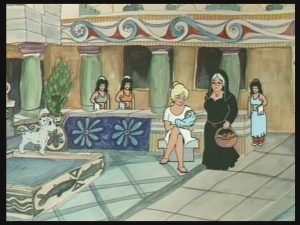 BTW, this is the palace where the actual king was born
BTW, this is the palace where the actual king was born
Obviously not everybody was satisfied.
So one thing after another and Herkules sets off to perform heroic deeds.
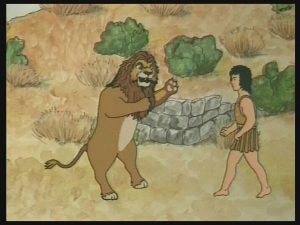 Everybody knows he had strangled the lion but who knew they boxed too?
Everybody knows he had strangled the lion but who knew they boxed too?
And while performing the labours he also meets a daughter of some local ruler and tries to win her heart too.
And after defeating The Hydra (without cauterising the stumps but with a completely unexpected method!) he has to deal with centaur.
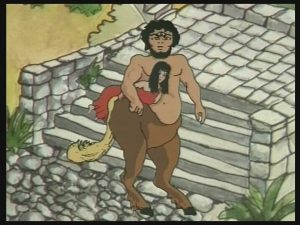 Nessus stealing the fair maiden
Nessus stealing the fair maiden
I bet you didn’t expect that centaurs can look like that!
And after that he’s sent to retrieve Cerberus.
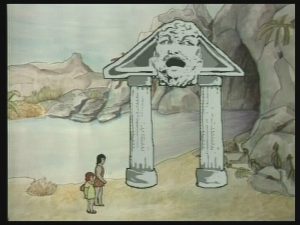 The entrance to the underworld
The entrance to the underworld
And after displaying the dog and in the middle of marriage ceremony Zeus calls him to help defeat Olympus from the monsters escaped from the underworld. Actually it was an uprising of titans who managed to break free from Tartarus and IIRC it happened when Herakles was a god already and lived on Olympus but you can’t expect an adaptation to cover all details.
There are many other rarely mentioned bits not covered here like Herakles voyaging with Argonauts or helping Prometheus which would make a fine story by themselves.
Nevertheless, this is wildly entertaining story and I highly recommend watching it. It’s a pity you’re more likely to find a rip-off instead.
So, after watching all these (except Arischa of course) what do I think about these?
Are those cartoons silly? Yes!
Are they poorly made and lack in quality? Definitely!
Are they entertaining to watch? Hell yes!
Despite all the flaws (or maybe because of them) these cartoons make me laugh and some of the art there (like Wabuu’s song) is actually not bad. But let’s sum up what we have here:
- tight budgets resulting in reusing characters, footage and many clichés? check
- unique art style? check
- unique way of storytelling? check
- intended for children but probably more enjoyed by adults? check
So there can’t be two different thought about it: ladies and gentlemen, Dingo Pictures has managed to create German analogue of anime. And that’s what it will be remembered for.
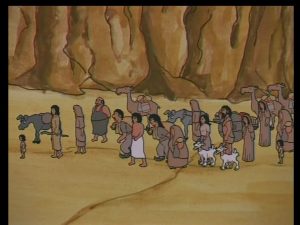 Exodus
Exodus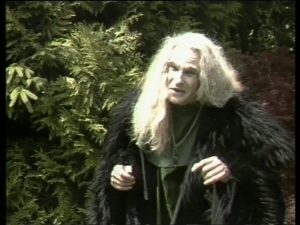 The narrator
The narrator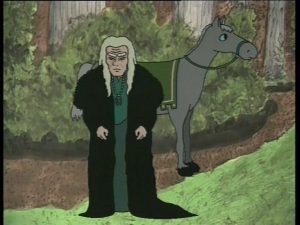 Merlin
Merlin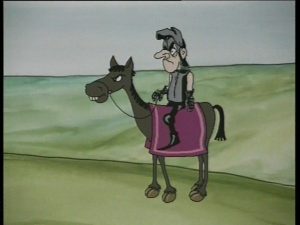 Mordred
Mordred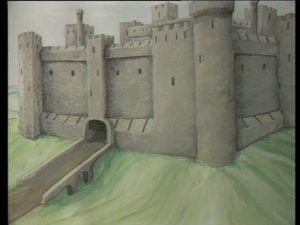 You know the place
You know the place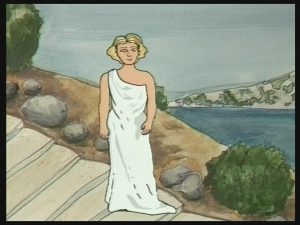 Europa
Europa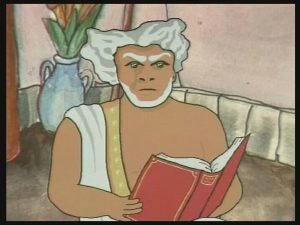 Zeus
Zeus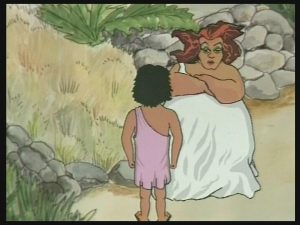 Hera
Hera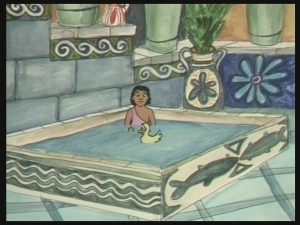 Eurystheus The Task-Giver
Eurystheus The Task-Giver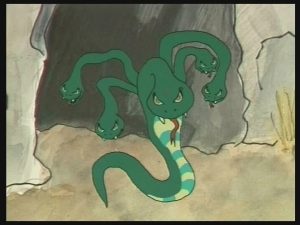 Hydra
Hydra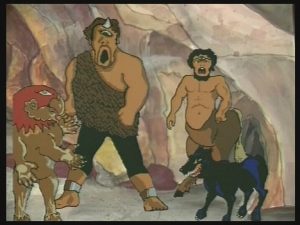 Underworld monsters
Underworld monsters
There’s still one more Dingo Pictures movie you need to watch. It was briefly mentioned on Dingo’s website when they were first active but has been removed. It was released on VHS but not DVD (at least in Germany). The film is titled “Griechische Sagen: Perseus” and you can view the film (via the Italian dub) at https://www.youtube.com/watch?v=ifKZGx3a19c.
Dingo also made a few video storybooks during its early years, two of which were remade into “The Toys Room” and “Easterbunnies”.
Oh, so there are some works even Dingo has forgotten. Thanks for the pointer. Three of their still picture stories are mentioned on the official site but I’m not sure they’re worth reviewing.
Links to the still picture versions:
The Toys Room: https://www.youtube.com/watch?v=P3mGzHxBI_I
Easterbunnies: https://www.youtube.com/watch?v=PQji9nwlNv0
The other three (“Fröhliche Weihnachten”, “Weihnachtsgeschichten” and “Hampie, ein kleiner Wal entdeckt seine Welt”) are not available to view on the Internet as of now but the VHSs are available on Amazon.
I’ve found them already but thanks anyway. And while one of them is still Toys, another one is the different from the animated Easter Bunnies story (it’s most likely the same universe though).
You’re very welcome.
Also, thanks for the information regarding the Easter Bunnies stories. I though both had the same plot.